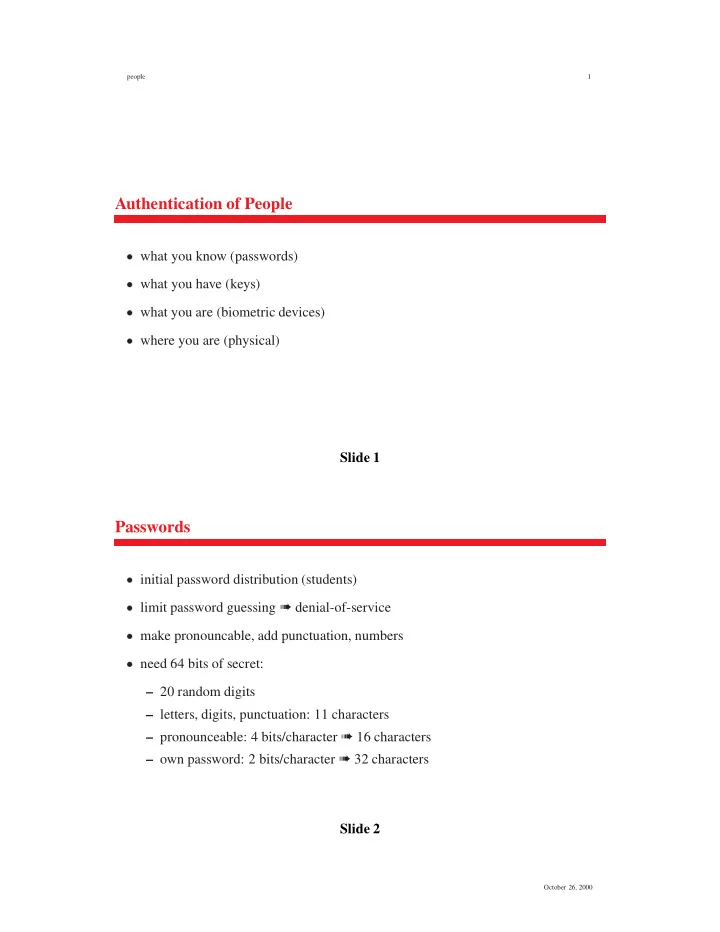

people 1 Authentication of People � what you know (passwords) � what you have (keys) � what you are (biometric devices) � where you are (physical) Slide 1 Passwords � initial password distribution (students) � limit password guessing ➠ denial-of-service � make pronouncable, add punctuation, numbers � need 64 bits of secret: – 20 random digits – letters, digits, punctuation: 11 characters – pronounceable: 4 bits/character ➠ 16 characters – own password: 2 bits/character ➠ 32 characters Slide 2 October 26, 2000
people 2 Trojan Horses � limit appearance (border, characters, interrupts) � show failed attempts at next successful login � prevent login by user programs Slide 3 Initial Passwords � need to meet root � ATM PIN entry � pre-expired passwords � difficulty: can’t change passwords (locks, Windows’95) Slide 4 October 26, 2000
people 3 Authenticating Tokens � magnetic cards, memory cards (European phone cards) � smart cards: challenge/response � cryptographic calculator: typing, display encrypted time Slide 5 Biometrics – Accuracy False acceptance rate (FAR): The percentage of unauthorised persons accepted in error. False rejection rate (FRR): The percentage of authorised persons who are incorrectly denied acceptance. � one-try � three-try � remove “unstable” population � can adversary select impostors? � identical twins, family members vs. random impostor � fraud: with or without cooperation of Alice? Slide 6 October 26, 2000
people 4 Fingerprints False rejection rate: 1 to 5 % (three tries). False acceptance rate: 0.01 - 0.0001 % (three tries). Vulnerability: Dummy fingers and dead fingers Ease of use: Easy to use, but “suspect” Suitable: Not for people with damaged fingerprints due to daily handling of rough material. Speed: 2 seconds Storage: 800–1203 bytes Stability: change for children Slide 7 Hand Geometry False rejection rate: 0.2 % (one-try) False acceptance rate: 0.2 % (one-try) Vulnerability: difficult without cooperation Suitable: rheumatic hands Speed: < 3 seconds Storage: 9 bytes Stability: change for children, weight gain Use: Kennedy Airport Slide 8 October 26, 2000
people 5 Retinal Scans retinal vascular pattern False rejection rate: 12.4 % (one-try), 0.4 % (three-try); False acceptance rate: 0 Vulnerability: None; false eyes, contact lenses and eye transplants Ease of use: difficult, socially unacceptable Suitable: everyone with eyes Speed: 1.5 seconds; Storage: 40 bytes Stability: very stable; changed by some diseases/injuries Slide 9 Voice Recognition � single phrase ➠ tape recorder � changing phrases ➠ unreliable � background noise � colds � use with public phone Slide 10 October 26, 2000
people 6 Signature � shape and dynamics � some signatures easily faked, some variable � signing surface properties Slide 11 Other Biometrics � keystroke timing ➠ network? � hand veins � finger geometry � facial recognition ➠ perspective Slide 12 October 26, 2000
people 7 Recognizing Machines Detect differences even if “output signal” is the same: � reflective multi-faceted surfaces (ICBMs); � magnetic particles on credit card; � RF spectrum for phones Slide 13 October 26, 2000
Recommend
More recommend